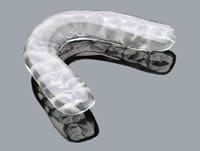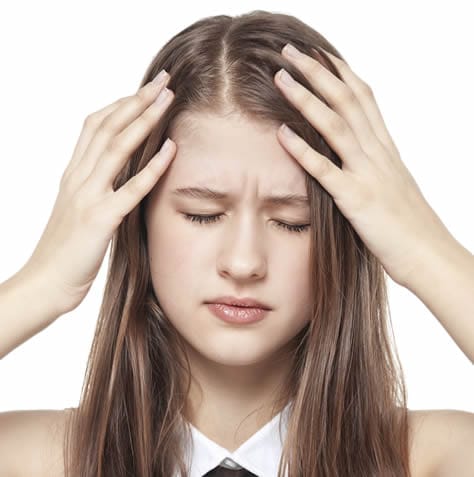Bruxism treatment in Southend
What is Bruxism?
Bruxism is the abnormal repetitive grinding or clenching of the teeth.
Why do People Grind/Clench their teeth?
Nobody knows for certain what causes Bruxism but it is likely that there are several reasons why people grind and/or clench. Some patients grind their teeth simply out of habit, others grind during periods of stress, either emotional or physical (e.g. chronic pain). There is also some evidence that irregularities in the occlusion or meeting of the teeth trigger a grinding response in some individuals.
Why does my Dentist think I grind my teeth, when I am unaware it?

Most people that grind or clench are completely unaware of the habit. It most often occurs at night time, during REM sleep.
The only clues you may have of a clenching habit are waking in the morning with vague pain or stiffness in the face and jaw.
Partners also may report that they can hear you grinding while you are asleep.
While checking your mouth, your Dentist routinely checks for the signs of Bruxism.
These are -
- Cheek ridging - thickening of the skin on the inside of the cheek to form a line which coincides with where the teeth meet.
- Tongue scalloping - indentations caused by the teeth on the sides or edges of the tongue
- Pathological wear - all teeth wear throughout life with normal function. When we examine a patient we ask ourselves is the wear we are seeing on the teeth consistent with their age. If the teeth appear excessively worn, this is pathological wear or Tooth Surface Loss (TSL)
Other signs and symptoms of Bruxism are:
- Persistent vague sensitivity in multiple teeth, with no obvious damage to the teeth
- Cracked tooth syndrome
- Repeated fracture of teeth and/or restorations
- Tenderness on examination of the muscles that control jaw movements.
- Headaches, especially in the first half of the day. Bruxism is a known trigger of migraine headaches.
If you have more than one of these signs or symptoms, then your dentist will suspect an underlying Bruxism habit.
Why is it so important to identify a Bruxism habit?
Grinding or clenching can be very damaging to the teeth, the jaw joints, and the facial muscles. It has been estimated that the forces applied to the teeth during grinding or clenching are 20 times greater than that of chewing. Bruxism is a major cause of dental pain and sensitivity.
If your dentist strongly suspects a Bruxism habit, he/she will recommend appropriate action to take to prevent the habit causing symptoms, and to protect the teeth and restorations from fracture. The presence of a grinding or clenching habit will also limit the choice of restorations and materials we can use when we are repairing your teeth.
How will my Dentist treat my Bruxism habit?

Firstly, your Dentist will advise you that he/she suspects that you are grinding or clenching your teeth. They will recommend that you wear a Soft Bite Guard at night-time while you are asleep. This is a 2mm thick soft silicone device that usually fits over the lower teeth and acts as a ‘cushion’ to prevent the hard tooth-on-tooth contacts that occur during Bruxism. It removes the damaging forces from the teeth - helping to protect them, and encourages the muscles controlling the jaw to relax - to reduce any tension headaches.
Making a soft bite guard is a simple procedure - your dentist will take impressions of your upper and lower teeth, and a registration of how your teeth meet when you bite. Our dental technician will make the bite guard on the models of your teeth. Your Dentist will see you for a second appointment where the bite guard will be tried onto your teeth to make sure it fits comfortably. They will check to make sure that you can place and remove the appliance easily. They will then give you appropriate written advice on how to use and maintain the appliance correctly.
In some cases, if there is a very obvious tooth interfering with the correct, even meeting of the teeth, your dentist may elect to selectively re-shape this tooth by grinding and polishing it to remove the interference as a possible trigger for the Bruxism.
How long will the treatment take?
You will need to wear your bite guard every night. For some individuals, the bite guard will break the grinding habit over time. After a period of 6-12 months your dentist may advise you to stop wearing it for a period of a couple of weeks to see if the habit persists or returns.
Your bite-guard should last a couple of years and you will need to bring it with you to each check-up, so your dentist can examine it to make sure it is still fit for purpose.
What will happen if I do not treat my Bruxism habit?
If the damaging forces associated with Bruxism continue over the longterm, you may experience several of the signs or symptoms discussed above. Furthermore, it will be more difficult for your dentist to predictably restore your teeth should they suffer damage or disease. All materials used in the restoration of teeth are designed to withstand the forces of chewing, not grinding. It will be reasonable to expect that your teeth will wear at a greater rate than normal and that they may not last your normal life expectancy

